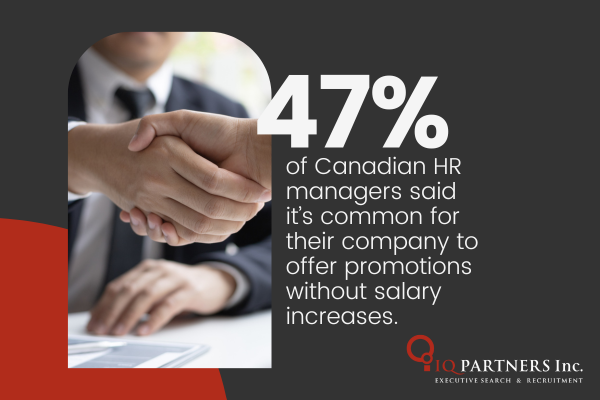Getting a promotion should be a great moment for employees. But what if it was only a promotion? No raise to go along with it. For many, this kind of sours the moment.
Promotions and raises are almost synonymous with each other. When you’re offered a promotion, more money usually comes along with it. However, there are a lot of employers who offer promotions without a boost in financial compensation. According to research, dry promotions are becoming more common. 13% of employers offered promotions without a pay raise in 2024, up from 8% in 2018.
Since 2001, our recruitment team has been part of close to 10,000 recruitment projects and we’ve learned a lot. One topic that all of our executive search team agrees on is promotions should generally be accompanied by a pay raise if employers want to foster an atmosphere of loyalty and retention. We advise against offering employees a promotion without additional compensation. However, many employers continue to engage in this frowned-upon practice.
So, let’s talk about it. Here’s what we’ll discuss:
- If you should accept a promotion without a pay raise
- If its common to get a promotion without a raise
- The legality of employers offering a promotion without a bump in pay
- How to negotiate salary if you’re offered a promotion
What is a dry promotion?
A dry promotion refers to a situation where an employee is given a higher job title or increased responsibilities without a corresponding increase in salary or benefits.
The key characteristics of a dry promotion include:
- Increased responsibilities: The employee takes on more duties or a higher level of responsibility.
- Title change: The employee receives a new job title that reflects their elevated role.
- No pay raise: Despite the additional responsibilities and title change, there is no immediate increase in salary or benefits.
Dry promotions can be a double-edged sword. Some employees may see it as a positive, while others view it as a slight.
Dry promotions can be motivating for some employees who appreciate the recognition and the opportunity to enhance their skills and career prospects. However, they can also lead to dissatisfaction and disengagement if employees feel they are not being fairly compensated for their increased workload and responsibilities.
Why do employers offer a promotion without a pay raise?
Employers could offer an employee a promotion without a pay increase for many reasons.
They could have good intentions. They want to recognize you, even if they don’t have the budget or approval for a raise. However, some companies could use this tactic to keep costs down. They may be using it as a creative way to fill open positions and save money.
Here are 4 reasons why employers might offer a promotion without a pay raise:
- Budget Constraints: Companies may be facing financial limitations that prevent them from offering pay raises despite promoting employees.
- Organizational Restructuring: During times of restructuring, employees may be promoted to fill roles without an associated pay increase as the company adjusts its budget and resources.
- Performance Recognition: Employers may use promotions to acknowledge an employee’s hard work and performance, intending to address compensation later.
- Career Development: Some organizations focus on providing career development opportunities, expecting that the increased responsibilities and experience will lead to future financial rewards.
If you suspect your employer may be trying to undermine or take advantage of you, it’s a sign you should consider other organizations to ensure you are compensated fairly in your industry.
Is it common to get a promotion without a pay raise?
Yes, it is becoming more common for people to receive a promotion without an immediate pay raise. 47% of Canadian HR managers said it’s common for their company to offer promotions without salary increases.
The commonality of this practice usually depends on your industry and company culture. The prevalence of dry promotions can vary significantly by industry and company. Some sectors may have more rigid compensation structures, while others might be more flexible.
Different companies have different practices and policies regarding promotions and compensation. Some may regularly offer promotions without pay raises, while others may tie promotions directly to salary increases.
While getting a promotion without a pay raise is common, employees need to evaluate the broader context and potential long-term benefits. Open communication with employers about compensation expectations and career development is crucial in making an informed decision.
Is it illegal to get a promotion without a pay raise?
No, it is not illegal to receive a promotion without a pay raise in Canada. Employment law in Canada does not mandate that a promotion must be accompanied by a salary increase. However, there are some important considerations:
- Employment Contracts: If your employment contract or a collective bargaining agreement specifies that promotions come with pay raises, then the employer must adhere to those terms. Any significant changes in your job responsibilities or title should be reflected in an updated contract or written agreement.
- Employment Standards: Employers must ensure that promotions and compensation practices do not violate anti-discrimination laws or other employment standards.
- Open Communication: It’s essential to have an open discussion with your employer regarding compensation expectations when offered a promotion. Ensure that any changes in job title or responsibilities are documented, even if there is no immediate pay raise.
If you plan to promote without increasing compensation, employers need to consider their people’s job satisfaction and the potential impact on retention. While legal, promoting employees without increasing their pay can affect morale and job satisfaction. Companies that frequently promote without pay raises might face higher turnover rates if employees feel undervalued.
Should I accept a promotion without a pay raise?
Deciding whether to accept a promotion without a pay raise depends on several factors. Where you are in your career, other opportunities internally and externally, and your overall view of the company all play a role.
Here are some potentially positive and negative considerations to help you make an informed decision if you should accept a promotion without an increase in pay:
Potential Benefits
- Career Advancement: The new role may provide valuable experience and the opportunity to develop new skills. Demonstrating your ability to handle more responsibility can position you for future promotions with pay increases.
- Job Satisfaction: The promotion may reflect your employer’s recognition of your hard work and capabilities. The new role might offer more engaging and challenging work, leading to greater job satisfaction.
- Networking: A higher position can increase your visibility within the organization, potentially leading to new networking opportunities.
Potential Drawbacks
- Fair Compensation: Taking on more responsibilities without a pay raise may lead to feelings of being undervalued. The new role might come with higher expectations and pressure without corresponding financial rewards.
- Work-Life Balance: More responsibilities can mean longer hours and increased stress, impacting your work-life balance.
- Future Negotiations: Accepting a promotion without a pay raise might set a precedent, making it harder to negotiate salary increases in the future.
What Should Employees Consider Before Accepting A Promotion Without A Raise?
Every situation is unique. There are times when taking a promotion is the best move for you, even if there isn’t a pay increase. Make sure you carefully consider the entirety of the situation before making a decision:
- Assess the Role: Understand the new responsibilities and how they align with your career goals. Consider whether the role will provide you with skills and experience valuable for your long-term career.
- Evaluate the Company’s Situation: If the company is currently unable to offer raises due to financial constraints, consider if a future pay raise is likely once the company’s situation improves.
- Negotiate Other Benefits: If a pay raise is not possible, negotiate for other benefits such as additional vacation time, flexible working hours, professional development opportunities, or a future pay review.
- Set Clear Expectations: Discuss with your employer the possibility of a future salary review after a certain period or upon meeting specific performance metrics.
- Personal Considerations: Reflect on your financial situation and whether you can afford to take on more responsibility without an immediate pay increase.
How to negotiate salary during a promotion?
The offer of a promotion is a realistic time to negotiate. So, discuss your expectations with your manager. Employees need to discuss their expectations with their employers. If a promotion comes without a pay raise, it’s reasonable to ask about the timeline for future compensation reviews.
There is also the opportunity to negotiate other benefits and perks, such as increased vacation time, flexible working arrangements, or professional development opportunities.
A Final Word About Promotions Without Pay Raises
It is increasingly common for employers to offer a promotion without pay raises. This can be risky because you could make your people feel unfairly compensated or undervalued, even if you have good intentions. You could have trouble retaining people and develop a poor reputation.
More On Compensation By Our Executive Search Team
Are In-Office Workers More Likely to Receive Raises & Promotions?
Wage-Fixing and No-Poaching Agreements Are Illegal In Canada







